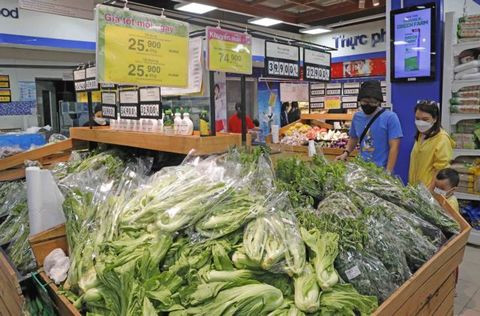
Co.opmart Hà Đông in Hà Nội. Many supermarkets in Hà Nội must maintain thousands of essential items at 10-50 per cent discount to ensure stability in the purchasing power. — VNA/VNS Photo Trần Việt
According to Trần Duy Đông, head of the Domestic Market Department under the Ministry of Industry and Trade, the main goal set for this year is to promote the strong development of the domestic market, striving to increase the total retail sales of consumer goods and services to 8 - 9 per cent.
According to retailers, Việt Nam's economy is forecast to maintain growth in 2023, but it still faces many difficulties. Especially, competition in the retail market is predicted to be more intense with the participation of new retailers and operation expansion of existing domestic and international retailers.
Meanwhile, many shops in big cities are closed, and many retail spaces in busy business streets are hanging signs for lease. Many supermarket chains continuously reduce prices as well as carry out trade promotion programmes to promote consumption in the context of many consumers tightening their belts.
A recent survey by the auditing firm PwC Vietnam has showed that Vietnamese consumers are more cautious in their spending habits from now until this year-end. About 62 per cent of Vietnamese consumers say they expect to cut non-essential spending. While 54 per cent of Vietnamese respondents say they will spend less on luxury items, followed by travel (42 per cent) and consumer electronics (38 per cent) because cost increases are prohibitive.
In that context, the retail enterprises in Việt Nam have had new and effective ways to increase their purchasing power. Among the methods of stimulating consumption, the important solution is to cut costs in the supply chain, thereby reducing the prices of the goods.
Representatives of some supermarkets in Hà Nội say that consumers no longer go shopping as many times as before and they are more interested in essential items, discounts and promotions. Therefore, the supermarkets must maintain thousands of essential items at 10-50 per cent discount to ensure stability in the purchasing power.
The WinMart/WinMart+ system has implemented trade promotion programmes two times a month with discounts of up to 50 per cent applied to many categories, and also has a non-profit booth for farmers to sell their products.
Vũ Vinh Phú, an expert in the retail market, told Nhà Báo & Công Luận (Journalists & Public Opinions) newspaper that the prices of some goods items had increased in the past few months, especially essential items such as sugar, cooking oil, instant noodles, and eggs.
There were a number of objective conditions to make the prices of the goods rise, such as the increase in prices of electricity, water, textbooks, as well as tuition fees, airline fares, and the cost of seasonal tourism.
However, the price of input products such as gasoline and oil had decreased by 20 per cent to 30 per cent for many months, and the freight cost had also dropped.
Phú said that if the price increase at present could not be controlled and even if that situation got worse, it would certainly inhibit the increase in domestic purchasing power.
Việt Nam has many domestically produced goods items and imported goods, especially an abundant supply of agricultural and food products meeting domestic consumption and export. But the increase in goods prices will cause difficulties for the domestic market, according to Phú.
Therefore, Phú suggested that the State should supplement the documents on commodity price management when there are sudden price increases that cause market instability, besides the list of goods items under the State management in price.
It should continue to promote the distribution of goods on the domestic market. Production and business enterprises should have close linkages in supply chains to reduce unreasonable intermediaries while supplying goods for shops at trading centres and supermarkets, he said.
The State needed to invest in the development of infrastructure such as road and ports, modernise the transport means, and build a logistics system to reduce the cost in circulation of goods.
It should also organise trading floors for agricultural products and foods to ensure transparency in trading goods, and focus on national reserve of essential goods, he added.
Retail sales up
Total retail sales of consumer goods and services increased 10.4 per cent year on year to almost VNĐ3.53 quadrillion (US$149 billion) in the first seven months of 2023, compared to a rise of 15.7 per cent during the same period of 2022, reported the General Statistics Office (GSO).
Goods retail sales were estimated at about VNĐ2.78 quadrillion during the period, accounting for 78.7 per cent of the total and rising 9 per cent from a year earlier.
In particular, retail sales of food went up 12.9 per cent, cultural and educational products 10.1 per cent, apparel 8.8 per cent, household tools and equipment 3.6 per cent, and vehicles (except for automobiles) 1.7 per cent.
Meanwhile, accommodation and restaurant services generated about VNĐ377.3 trillion in revenue, making up 10.7 per cent of the total and rising 16.3 per cent.
Tourism revenue soared 53.6 per cent to VNĐ18.6 trillion, as July was the peak month of summer tourism. Earnings from other services stood at VNĐ356.2 trillion, equivalent to 10.1 per cent and up 13.8 per cent year on year. — VNS